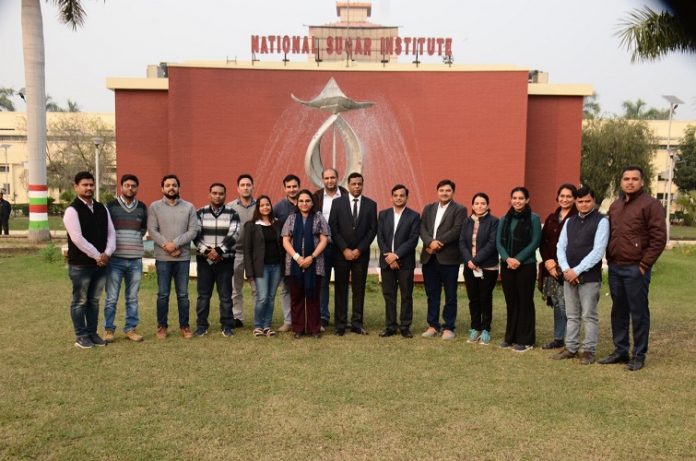Five days training programme for scientists of Central Pollution Control Board and National Mission for Clean Ganga concluded today at National Sugar Institute, Kanpur. The training programme was organized on the request of Central Pollution Control Board to impart training about standard operating procedures for designing & operating Effluent Treatment Plants and newer technologies for minimizing fresh water usage and waste discharge.
On the concluding day, the participants gathered practical knowledge of operations in molasses and grain based distillery units. Dr. (Mrs.) R. Ananthalakshmi, Assistant Professor of Biochemistry demonstrated methodologies of ethanol and beer production at the nano-ethanol & brewery units at the institute. Various permutations and combinations of newer fermentation & distillation techniques were described which enable higher productivity, lower energy requirement and lower effluent generation as well.
In the valedictory function, certificates were provided to the participants by Shri Narendra Mohan, Director, National Sugar Institute, Kanpur. In his concluding remarks, Director, National Sugar Institute stressed upon not only on minimizing waste generation by adopting “Best Available Technologies” but also converting “Waste to Wealth”. Molasses based distilleries which are considered a major cause of pollution can take a lead by converting Carbon Di-oxide from distilleries to dry ice for preserving vaccines and packed foods or for using it in clarification of sugarcane juice in place of Sulphur Di-oxide. Similarly, huge quantities of potash can be recovered from ash from the incineration boilers and left over ash can be utilized for making bricks and roof panels. As regards sugar factories also, our objectives should be clear and we have to develop an out of box thinking to stop any fresh water usage in the sugar factories except during start of crushing operations. Looking to the quantity of water available in the sugarcane, sugar factories instead can become a source of providing water to society for meeting various needs, he said.












